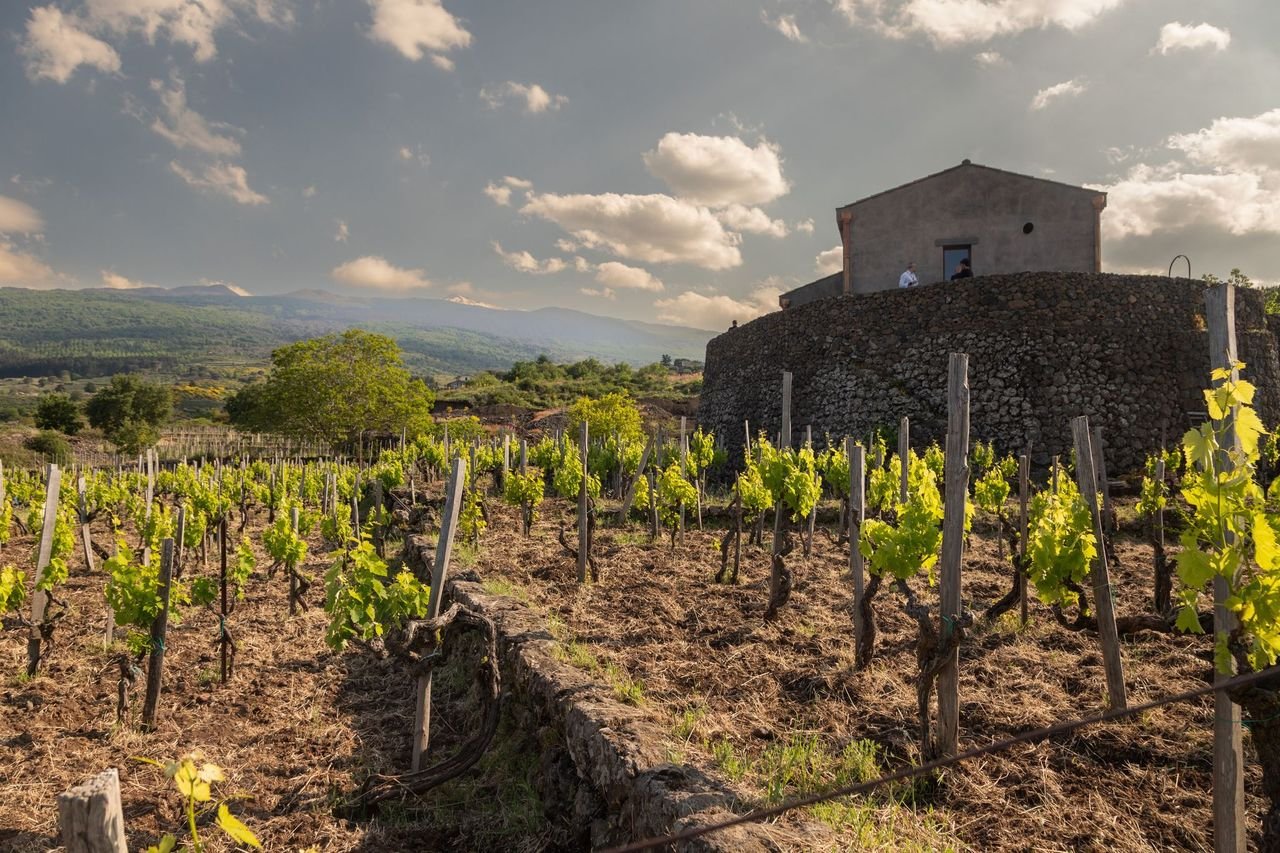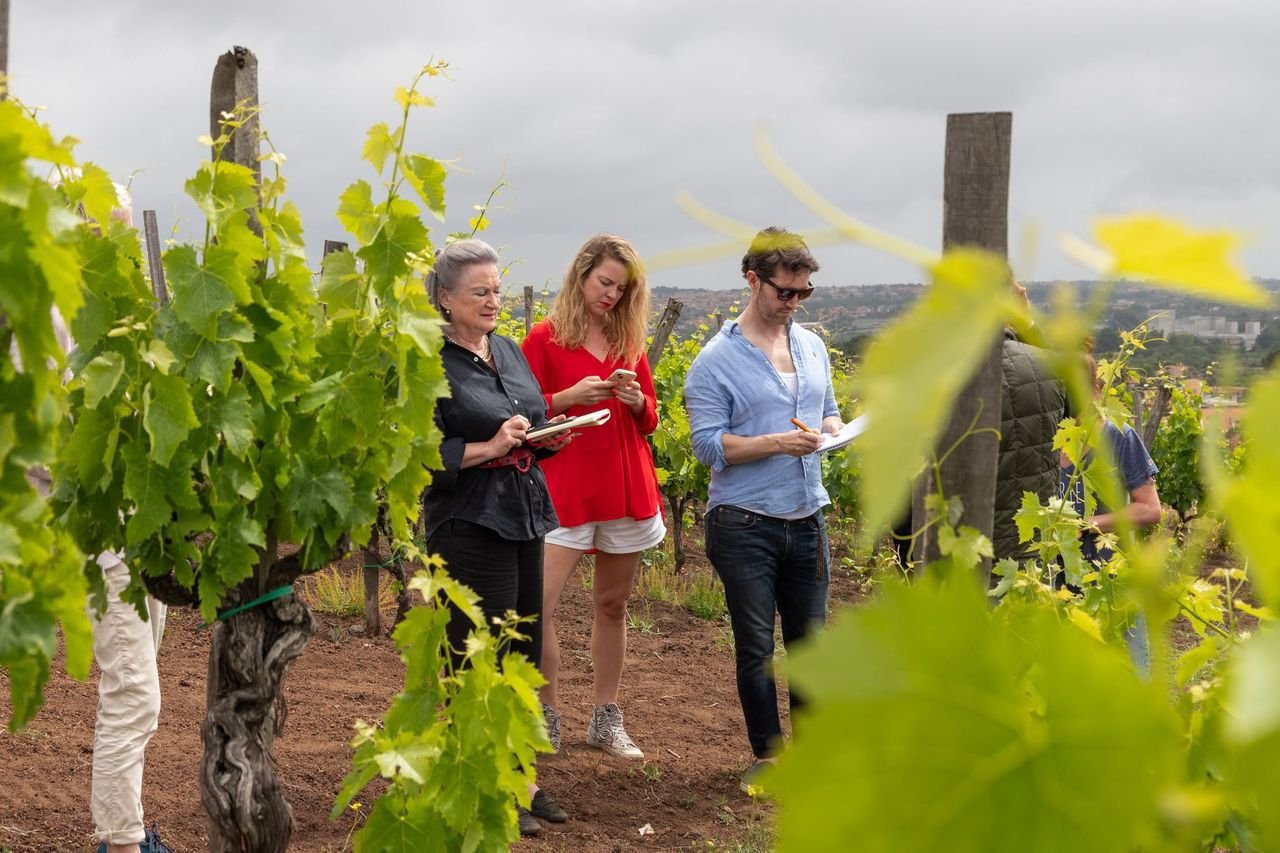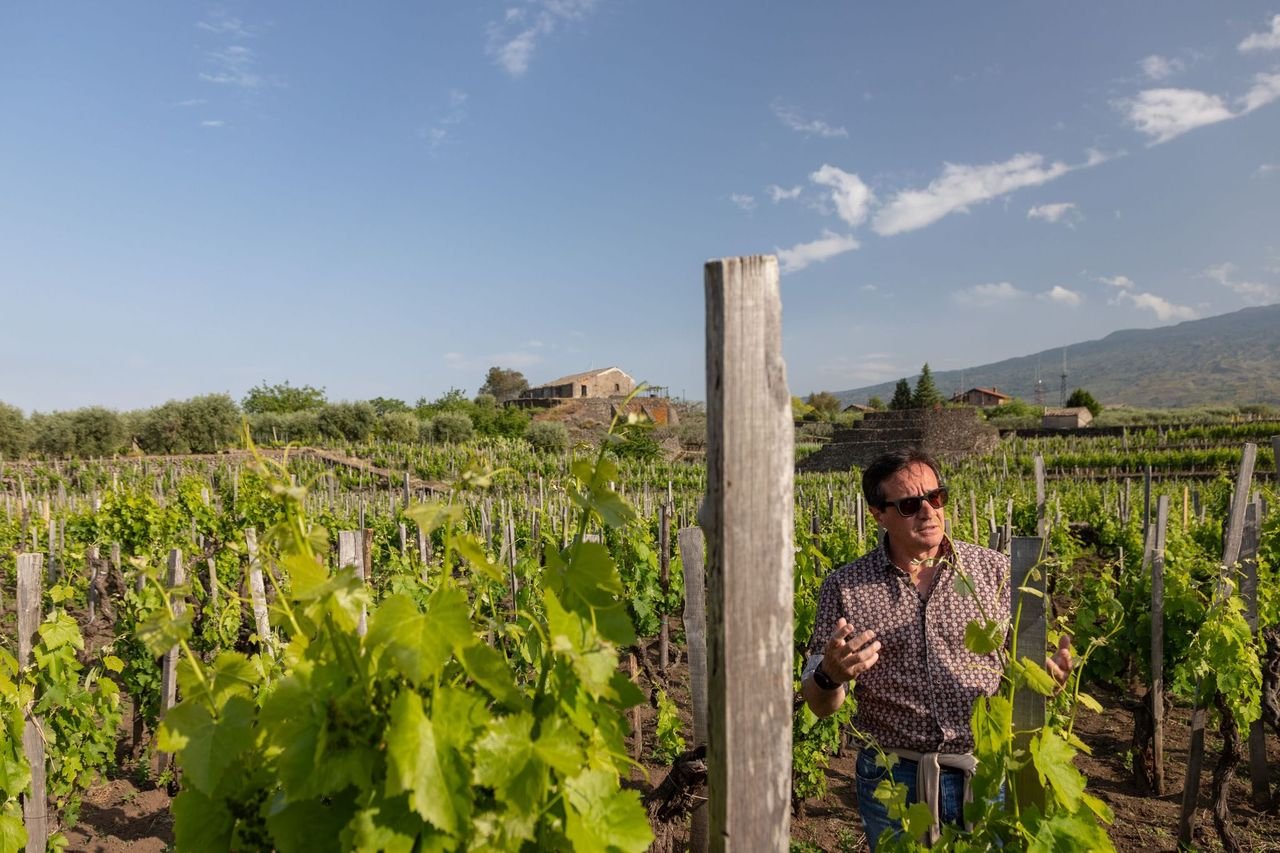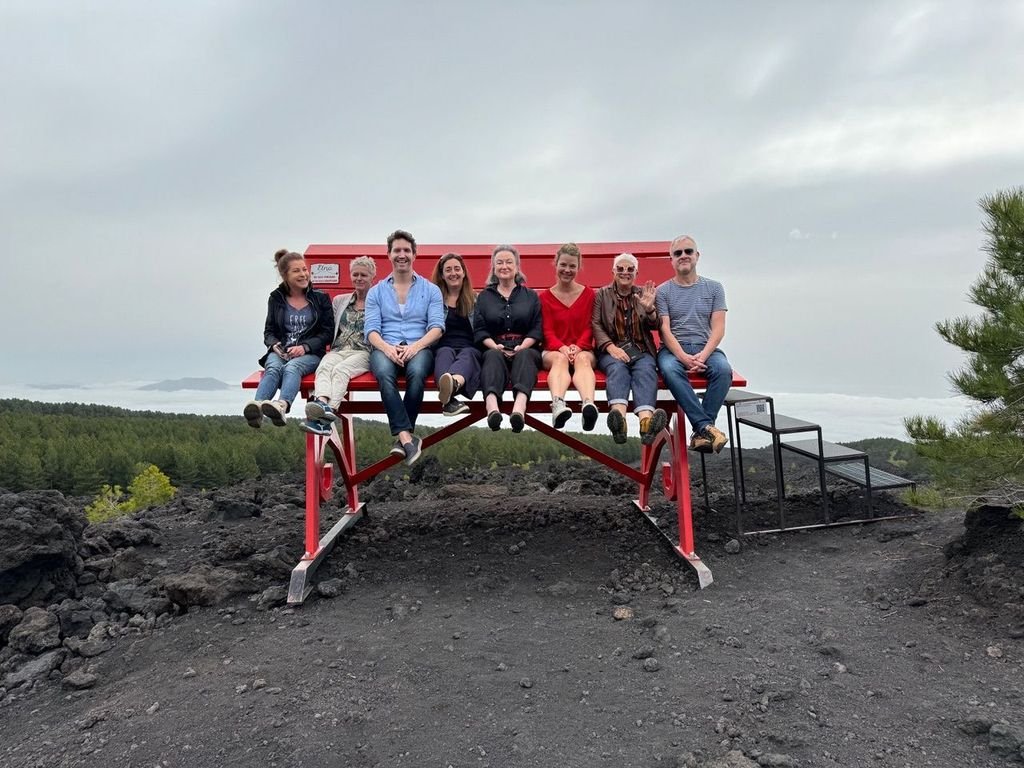The Old Vine Conference field trip to the ancient vineyards of Etna - May 2024
By Michèle Shah, The Old Vine Conference Regional Ambassador for Italy
Introduction
Etna is home to an ancient civilisation of vine-growing: the study of its rich viticultural history and understanding of its unique viticulture and oenology can tell us as much about its past as it can inform us of its bright and sustainable future. Together with The Old Vine Conference, five of Etna's most prolific old vine wineries hosted an exceptional four-day field-trip to Sicily. Through a series of alfresco seminars, viticultural workshops, tastings and masterclasses Etna's exemplary winemaking mosaic was showcased through the old vine lens revealing what makes its wines so ethereal.
A few words on the old vines on Etna
Nestled on the slopes of one of the world's most active volcanoes, Mount Etna in Sicily, lies a unique viticultural treasure trove. Etna's imposing height of over 3,300 meters profoundly influences the wines produced here, where grapevines cling to ancient terraces, battling the elements to yield some of Italy's most distinctive wines. Etna's winemaking history dates back 3000 years, with the Greeks among the first to recognize the potential of its volcanic soil for grape cultivation. The combination of fertile volcanic ash, altitude, and abundant sunlight creates an unparalleled environment for vineyards, contributing to the distinctiveness of the wines produced in this region.
At altitudes ranging from 400 to 1,000 meters, Etna's vineyards benefit from cooler temperatures and significant diurnal temperature variations. These conditions allow grapes to ripen slowly, preserving acidity while developing complex flavors. The high-altitude terroir imparts a remarkable freshness and elegance to the wines, comparable to the finesse found in Burgundy and Barolo. Etna's geological history of continuous change and renewal has created a landscape layered with ash, pumice, and lava, providing soils rich in minerals that vary dramatically across the mountain's slopes. These soils contribute to the unique minerality, structure, and longevity of Etna wines, which often exhibit vibrant acidity and pronounced minerality.
Etna's vineyards are predominantly bushvines planted with indigenous grape varieties such as Nerello Mascalese and Nerello Cappuccio for red wines, and Carricante and Catarratto for whites. The mountain is divided into 133 Contrade, each with its own microclimate due to Etna’s varied elevation and exposure. Ancient vines over a century old continue to produce exceptional grapes, with each vineyard shaped by its location and the vision of its winemaker. Etnean winegrowers share a deep, symbiotic relationship with the volcano, understanding that the same forces that pose a threat also enrich their soils and define their wines.
Wineries visited
Animaetnea - Founded by the Cuseri Moretti family and under the guidance of winemaker Emiliano Falsini, Animaetnea is dedicated to producing wines that showcase the distinct differences between the contrada crus. Their wines, including the Etna Rosso DOC from Contrada Santo Spirito, are expressive and deeply connected to their terroir, reflecting the focused verticality of the region. Each bottle embodies the unique volcanic landscape of Etna, offering a true taste of its spirit.
Benanti - As pioneers of modern winemaking on Etna, the Benanti family holds a prestigious place in the region's viticultural history. Their wines, renowned for their quality and authenticity, reflect a deep, generational connection with the mountain. The estate’s unwavering commitment to excellence has made their wines highly coveted by connoisseurs worldwide. Tasting a vertical of Benanti’s Serra Della Contessa and Rovittello parcel wines, from old vines in the south and north respectively, reveals the clear character differences between the sructure and veticality of these exceptional wines.
Cusumano's Alta Mora - Under the auspices of the renowned Cusumano family, Alta Mora is celebrated for its modern approach to winemaking and unwavering commitment to quality. Their wines, sourced from Contrada Guardiola—a 2-hectare natural amphitheater of 150-year-old vines—feature a Nerello Mascalese distinguished by its purity and elegance. The high-altitude vineyards of Contrada Arrigo, Linguaglossa, and Castiglione di Sicilia in the Contrade Verzella and Pietramarina offer unique climatic conditions that impart vibrant acidity and complex flavors to their Etna Bianco DOC and Etna Rosato. These wines truly express Etna's potential.
I Vigneri - Salvo, Simone & Andrea Foti - Salvo Foti a visionary in the renaissance of Etna's viticulture, is acclaimed for his dedication to traditional winemaking methods and deep respect for the terroir and its people. His wines are celebrated for their authenticity and character, often sourced from some of the most extreme vineyards on the mountain, including those at altitudes reaching 1300 meters. I Vigneri’s Vinupetro Etna Rosso DOC, crafted from century-old vines and heritage cuttings replanted in 2005, exemplifies Foti's philosophy and dedication to preserving Etna’s cultural heritage. The Rosè Vindiluce label, planted in one of Etna’s highest vineyards at 1200 meters in Contrada Nave on Western Etna, features a vibrant blend of Grenache, Minnella Nera, Grecanico, Minnella Bianca, and other grape varieties, showcasing a vibrant mix of heritage and innovation.
I Custodi - Owned by Mario Paoluzi and managed by Salvo Foti, I Custodi is dedicated to sustainable viticulture and preserving Etna's rich winemaking heritage. The estate safeguards some of the appellation's oldest vines, ageing 250 years, from which it produces the stunning wine ‘Saeculare,’ based on Nerello Mascalese with a small percentage of Nerello Capuccio and Alicante. They also craft an excellent, mineral, vibrant white Carricante from Contrada Caselle in Milo, at 900 meters above sea level. Planted on the eastern slopes—one of the highest and wettest areas on Etna—this location uniquely produces Etna Bianco Superiore from 100% Carricante. I Custodi’s ‘Imbris’ top label, an elegantly expressive floral mineral white, exemplifies this exceptional terroir.
Conclusion
Meeting the producers on Etna and being immersed in this unique experience was wonderful. The opportunity to match the wines with the local gastronomy while standing on this majestic volcano was overwhelming. This direct interaction with the people and the land behind the wines added an unparalleled richness to the experience, further highlighting the remarkable story of Etna’s viticulture. The dynamic evolution of this region, combined with the deep connection between the volcano and the vine, makes Etna's vineyards a testament to the resilience and enduring legacy of traditional winemaking.
Field Trip Participants:
Belinda Stone
Belinda Stone is one of the OVC Directors, she is responsible for the day to day running of the non-profit and designing, overseeing and running its extensive program. A Chartered Marketer in the wine trade, she has collaborated with some of the world’s leading wine brands.
Michèle Shah
Michèle Shah, Italy Regional Ambassador for OVC, is a noted marketer, writer, communicator, and judge. She works with producers across Italy and has a deep love for Italian wine, gastronomy and heritage. Michèle also organizes wine tours for businesses and enthusiasts.
Tamlyn Currin
Tamlyn Currin is a senior editor for Jancis Robinson, where she has worked for nearly 17 years. Passionate about sustainability, she is currently studying for a degree in Environmental Science. Tamlyn believes that old vines hold many secrets for the future.
Amanda Barnes
Amanda Barnes is an award-winning wine writer and author, contributing to several international wine publications such as Decanter, World of Fine Wine, and The Drinks Business. A Stage 3 Master of Wine student, she is also the Editor of the Circle of Wine Writers' monthly publication.
Kate Hawkings
Kate Hawkings is a freelance writer and wine consultant based in Bristol. She is the wine columnist for Olive magazine and contributes to various trade and consumer press. Her book, ‘Aperitif,’ was shortlisted for the Fortnum & Mason 'Best Debut Drinks Book’ Award.
Rob Buckhaven
Rob Buckhaven is the Metro Drinks Editor, author of "The Alcorithm," presenter, and two-time IWSC Wine Communicator of the Year shortlistee. He writes about drinks for the Evening Standard and has appeared regularly as a wine expert on shows like The Market Kitchen, Something for the Weekend, and The Michael Ball Show.
Margaret Rand
Margaret Rand, Editor for Hugh Johnson’s Pocket Wine Book, writes for World of Fine Wine, winesearcher.com, and timatkin.com. Over her four-decade wine-writing career, she has won various awards and authored books, including "Grapes & Wines" (2001) and "101 Wines to Try Before You Die" (2018).
David Kermode
David Kermode is a journalist, writer, broadcaster, and international wine judge with two decades of experience across print, online, TV, and radio. He has appeared as a drinks expert on ITV’s "This Morning" and hosts the podcast "The Drinking Hour with David Kermode" on Food FM. Additionally, he presents a wine hour on BBC local radio. David is a columnist for Club Oenologique and regularly contributes to Waitrose Drinks and trade publications The Buyer and Harpers.







